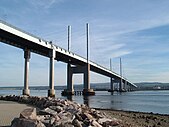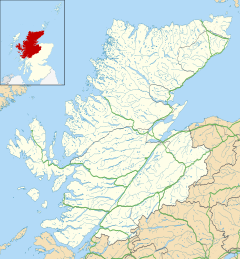
Inverness
City in the Highlands of Scotland / From Wikipedia, the free encyclopedia
Dear Wikiwand AI, let's keep it short by simply answering these key questions:
Can you list the top facts and stats about Inverness?
Summarize this article for a 10 year old
Inverness (/ˌɪnvərˈnɛs/ ⓘ; Scots: Innerness;[5] from the Scottish Gaelic: Inbhir Nis [iɲɪɾʲˈniʃ], meaning "Mouth of the River Ness") is a city in the Scottish Highlands, having been granted city status in 2000.[6] It is the administrative centre for The Highland Council[7] and is regarded as the capital of the Highlands.
Inverness
| |
|---|---|
| City of Inverness | |
Inverness skyline and the River Ness | |
Location within the Highland council area | |
| Coordinates: 57.4778°N 4.2247°W / 57.4778; -4.2247 | |
| Council area | Highland |
| UK Parliament | Inverness, Nairn, Badenoch and Strathspey |
| Scottish Parliament | Constituency: Inverness and Nairn Region: Highlands and Islands |
| Historic county | Inverness-shire |
| Country | Scotland |
| Sovereign state | United Kingdom |
| First settled | Before the 6th century AD |
| Royal Charter | C. 12th Century AD |
| City status | 2000 |
| Area | |
| • Locality | 24.3 km2 (9.4 sq mi) |
| • Urban | 31.3 km2 (12.1 sq mi) |
| Population | |
| • Locality | 47,790 |
| • Rank | 12th, Scotland |
| • Density | 2,000/km2 (5,100/sq mi) |
| • Urban | 63,730 |
| • Urban density | 2,000/km2 (5,300/sq mi) |
| • Metro | 81,968 |
| • Language(s) | English Scots Gaelic |
| Demonym | Invernesian |
| Postcode | |
| Area code | 01463 |
Historically it served as the county town of the county of Inverness-shire. Inverness lies near two important battle sites: the 11th-century battle of Blàr nam Fèinne against Norway which took place on the Aird, and the 18th century Battle of Culloden which took place on Culloden Moor.[8] It is the northernmost city in the United Kingdom and lies within the Great Glen (Gleann Mòr) at its northeastern extremity where the River Ness enters the Beauly Firth. At the latest, a settlement was established by the 6th century with the first royal charter being granted by Dabíd mac Maíl Choluim (King David I) in the 12th century. Inverness and Inverness-shire are closely linked to various influential clans, including Clan Mackintosh, Clan Fraser and Clan MacKenzie.[9]
The population of Inverness grew from 40,969 in 2001 to 46,969 in 2012, according to World Population Review.[10] The Greater Inverness area, including Culloden and Westhill, had a population of 56,969 in 2012. In 2016, it had a population of 63,320.[11] Inverness is one of Europe's fastest growing cities,[12] with a quarter of the Highland population living in or around it.[13] In 2008, Inverness was ranked fifth out of 189 British cities for its quality of life, the highest of any Scottish city.[14]









